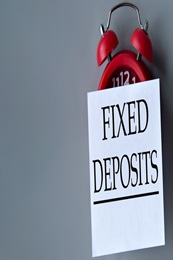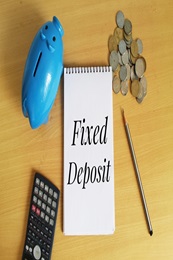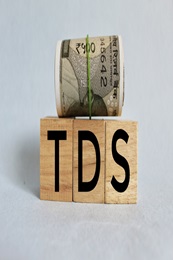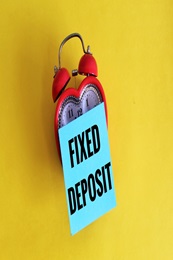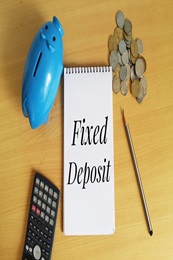The Advantages of Investing in Fixed Deposits Over Real Estate
April 26, 2025

Investing your hard-earned money wisely is crucial to secure your financial future. When it comes to low-risk investments, Fixed Deposits (FDs) and real estate have always been popular choices. However, understanding which option suits your financial goals and circumstances can be a challenge.
In this blog post, we will compare fixed deposits vs. real estate investments to help you make an informed decision.
Real Estate vs. FD: Investment Comparison
Liquidity and Flexibility
One of the most significant advantages of fixed deposits is their liquidity. Unlike real estate, which involves a lengthy and often complicated selling process, FDs offer easy access to your funds. You can usually withdraw your investment, albeit with some penalties, if you need money before the term ends.
In contrast, selling property can take months or even years, and the process involves various legal and transaction costs.
Predictable Returns
Fixed deposits offer guaranteed returns, making them a low-risk investment option. The interest rate is fixed, so you know exactly how much you will earn by the end of the term.
Real estate investments, however, come with fluctuating returns. Property values can be volatile, and rental income may not always be consistent, leading to unpredictable financial outcomes. You have real estate funds and REITs (Real Estate Investment Trusts), but these are market-linked products and prone to market fluctuations.
Investment Amount
Real estate investment requires hefty investments. To buy a property in a metro city, you might need at least ₹40 lakh. If you don't have enough cash, you can opt for a home loan. Compared to real estate investments, FDs are much simpler. You can open an FD with as low as ₹1,000.
Lower Maintenance Costs
Investing in real estate requires ongoing maintenance and management. Property owners must handle repairs, property taxes, insurance, and other expenses.
On the other hand, fixed deposits require no maintenance. Once you invest, you simply watch your interest accumulate without any additional costs or responsibilities.
Ease of Management
Fixed deposits are straightforward to manage. Once you’ve selected your FD, there are no further actions required until the maturity date. This simplicity is appealing for investors who prefer a passive investment strategy.
In contrast, real estate investments often require significant time and effort for property management, including dealing with tenants, handling maintenance issues, and navigating market fluctuations. The hands-on nature of real estate can be burdensome for many investors.
Risk Factor
Real estate investments carry higher risk compared to fixed deposits. Property values can decline due to economic downturns, natural disasters, or changes in the real estate market.
Fixed deposits, being a low-risk investment, offer a guaranteed return and are usually backed by DICGC insurance up to ₹5 lakh, minimising your risk exposure. By allocating a portion of your portfolio to FDs, you can balance out higher-risk investments and ensure stability.
Transparency
Before making real estate investments, you need to be absolutely careful about the property you're planning to invest in. A lot of time sellers are not transparent with the property documents. This results in individually verifying all each claim made by the seller. You can hire a lawyer, but that again is cost intensive.
FDs are simpler to manage. You can check your investments via net banking or mobile app.
So, Real Estate or Fixed Deposits: Where Should I Invest?
With all said and done, your investment decision should be aligned to your financial goals. Real estate investments are preferred by risk-tolerant investors - investors who can take a bet on the real estate market. And that requires a lot of experience and thorough research. If you are familiar with the real estate market and have enough capital to take the bet, you may opt for real estate investments. Please consult a SEBI-registered financial adviser before investing.
If you're just starting out your investment journey or seeking safe and secure returns, start with Fixed Deposits. There are different types of FDs available in India with each serving a specific purpose. Check the features of each FD and select the one that's best aligned to your financial goals.
Final Thoughts
Always aim to invest as per your financial goals. If in doubt, consult a financial adviser before investing. That said, FD investments are quite straight forward. You just need to open an account with Video KYC or by visiting a bank branch and make the initial payment as per your preference.
Looking to grow your savings faster? Ujjivan SFB offers a wide range of fixed deposit products. Select the FD of your choice and take a step forward to your financial goals. Alternatively, you can browse through Ujjivan SFB product suite - our wide range of financial products are designed to make your financial life better.
FAQs
1. Are the returns from fixed deposits taxable?
Yes, the interest earned on fixed deposits is taxable as per your income tax slab. A minimum TDS of 10% is applicable if your interest income exceeds ₹40,000 (₹50,000) in a financial year. Please note that this TDS exemption on FD interest is applicable for FY 2024-25 (till March 2025). For FY 2025-26, the current TDS exemption limit has been hiked to ₹50,000 for regular citizens and ₹1 lakh for senior citizens.
2. How long does it take to open a fixed deposit account?
Opening a fixed deposit account online is a quick and hassle-free process. All you need to do is provide your PAN and Aadhaar details, choose the tenure and interest pay-out option (monthly, quarterly or at maturity), complete your Video KYC and make the initial payment. Alternatively, you can visit a bank branch to open an FD.
3. Are senior citizens eligible for higher interest rates on fixed deposits?
Ujjivan SFB offers higher interest rates, up to 0.5% above the normal rates, for senior citizens. However, you need to be 60 years or above to be eligible for senior citizen FDs.
4. Can I have multiple fixed deposit accounts with different tenures?
Yes, you can open multiple fixed deposit accounts with different tenures, according to your financial goals and liquidity requirements.
5. What should I consider before investing in real estate?
Before investing in real estate, consider factors such as location, market trends, potential rental income, legal obligations, and additional costs like stamp duty and property taxes.
6. Is it possible to add funds to an existing fixed deposit account?
No, once a fixed deposit is opened, you cannot add funds to it.
7. What happens if a bank offering fixed deposits goes bankrupt?
In case of bank bankruptcy, the Deposit Insurance and Credit Guarantee Corporation (DICGC) provides insurance coverage up to ₹5 lakh per depositor per bank.
8. Can I withdraw my fixed deposit before maturity?
Yes, you can withdraw your fixed deposit before maturity; however, this may attract penalties or a reduced interest rate.
Latest Blogs

Best Current Accounts in India: Simplify Your Business Transactions
April 22, 2025
In the fast-evolving world of Indian business, having a reliable current account is more than just a financial necessity—it’s a strategic asset.

Top Savings Account Schemes to Start the New Financial Year 2025–26
April 19, 2025
The beginning of a new financial year isn’t just about filing taxes or revisiting your investment strategy—it's also the perfect time to re-evaluate where you park your money.

Disappointed with Your Savings Account? Switch to This Small Finance Bank
April 17, 2025
In April 2025, following the Reserve Bank of India’s (RBI) repo rate cut from 6.25% to 6%, several major banks have reduced interest rates on savings accounts.

7 Steps to Get Started Your Home Loan Application Process in India
April 16, 2025
Buying a home is one of the biggest dreams for most of us. But with rising property prices, it's not always possible to pay the full amount upfront. That’s where a home loan in India becomes a helpful option.

How to Keep Your Money Growing in a Volatile Market: A Comprehensive Guide
April 15, 2025
The Indian financial landscape in early 2025 has been quite unpredictable. According to Reuters, equity mutual fund inflows slumped to an 11-month low in March 2025 due to growing concerns around sectoral imbalances and global uncertainties.

